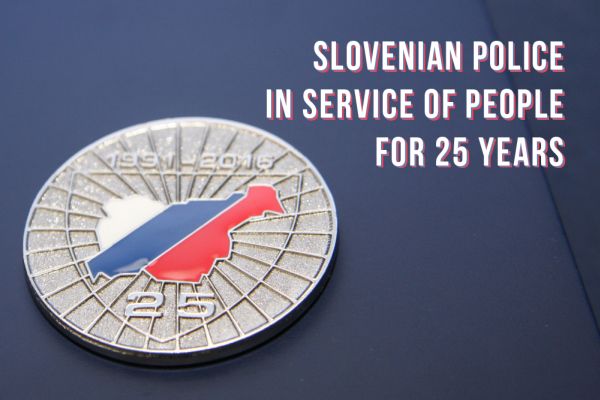In the past 25 years, the Slovenian Police had to overcome a difficult path.
During the key moments of the 1991 War for Independence, in the atmosphere of fear and uncertainty, the Slovenian Militia decisively joined the people in defending Slovenia. It was the only armed force on which Slovenian citizens could actually depend.

By carrying out various activities before the war, members of the Slovenian Militia deliberately protected the emerging democratic processes, and later also unselfishly participated in the armed conflicts against the hegemonic central government, in which some of them lost their lives.
Their actions showed how internally unified, excellently organised, experienced and highly professionally qualified the Slovenian Police really is.
In any other case, the Slovenian Militia, as part of Slovenia's defence forces, could not have played such an essential role in paving the way to a new, free and independent state 25 years ago. Its close cooperation with the civil population, which placed complete trust in the police, was also deeply significant. In addition to their commitment to performing duties on a daily basis and in a professional manner, the trust and great reputation among the people have built a foundation for successful work the Slovenian Police has continued to carry out to this day.
Without a close cooperation with citizens, the police could not have developed into a modern security institution operating in accordance with the European standards and achieving impressive results. Furthermore, without the wholehearted support of people, the police could not have maintained an enviously high level of security that has been provided in Slovenia for the past 25 years.
Many people take the police for granted, but it is a fact that security is a rare commodity, which requires continued active efforts to remain at such a high level. It is also a value that has not been lost during the transition into a different system, which was unfortunately not the case with many others. On the contrary, Slovenia has maintained and additionally improved security as one of the most important values of a democratic state.
Slovenia therefore remains an 'oasis' of security and peace, which is also evident in numerous international indexes, where it is ranked among the safest countries in the world. This is all thanks to the police as their professional activities help prevent crimes and contribute to the safety of all citizens and other people who live in or are visiting Slovenia. Moreover, the police reduces and manages other security risks, thus decreasing the number of threats to the integrity of people and their property and allaying their fear of becoming victims of crimes.
Today, there are 8,151 police officers in Slovenia, who are available 24 hours a day and who also perform their duties in the most difficult situations, even in the cold and rain, when necessary. They often have to endure severe physical and mental burdens and pressures, which can also be life-threatening. Nevertheless, each successfully completed task brings personal satisfaction, knowing that they have prevented a crime, found a perpetrator, or saved a person?s life.
There are 111 police stations across the state, and nearly half a million calls made to 113 in the past year alone indicate that people can still rely on police officers to help them whenever they are in trouble, whether a case concerns a stolen wallet, a break-in into an apartment, a traffic accident, or domestic violence. Even when people turn to the police 'only' in search of a professional opinion, preventive advice or perhaps even consolation, police officers try to provide a citizen-friendly service in such cases as well by listening and helping to the best of their ability and in a respectful manner.
Over more than two decades, the Slovenian Police achieved many historical milestones, launched extensive security projects and underwent organisational changes that affected the work of police officers and the public. The changes were aimed at increasing the professional level and efficiency of police work, developing preventive actions and introducing new forms and methods of work, all of which helped police officers working in the field to establish better relationships with people.
However, the years marked by the economic crisis affected the Police forces as well. In the future, the Police would like to see their work more appreciated and they would also wish to acquire new equipment, vehicles and various high-technology devices, so that they can continue to effectively fight the new, increasingly globalised and complex crimes.
Recently, Slovenia has gone through a period of intense social and political transformations. The once familiar world is once again changing as threats of terrorism, mass migration flows and other security-related phenomena represent new circumstances under which Slovenia faces specific questions never encountered before. All these challenges will require utmost commitment from police officers, since the basic mission of the police still remains exactly the same as it was 25 years ago, i.e. how to effectively guarantee security in the state in all work areas.
So far, the Police has successfully adapted to new social changes, and it certainly does not want to disappoint the citizens it serves in the future. The Police will continue their efforts to carry out their mission in a professional, lawful, responsible and fair manner, respecting the equality of all people before the law, their rights, freedoms and personal dignity, thus justifying their expectations and building public trust in the Police as one of the few the institutions that can, together with other bodies, guarantee security and the rule of law.
Slovenian Police
Maintaining a high level of security
- There are 8,151 police officers in Slovenia, who are available 24 hours a day
- 111 police stations
- 2015 - nearly half a million calls made to 113
The future
- Increase of the professional level of the police work
- Development of the preventive actions and new work methods for police officers working in the field to establish better relationships with people
- Faster acquirement of equipment, vehicles and various high-technology devices


